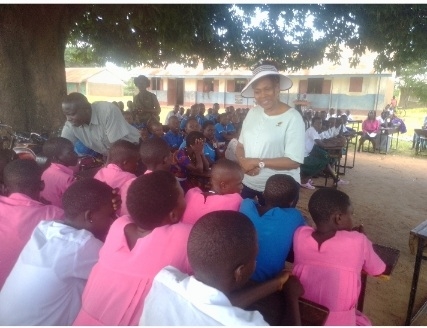By Enatu Steven.
The Rotary Club of Kampala, in collaboration with the Rotary Club of Ngora and other Rotary clubs, notably TBS Radio, successfully concluded a two-day medical camp at Kapir Health Centre III, addressing critical healthcare needs in the region. Held from September 20th to 21st, the camp attracted over 2,000 community members from Kapir and surrounding areas. A wide range of free medical services were offered, including screenings for communicable and non-communicable diseases.
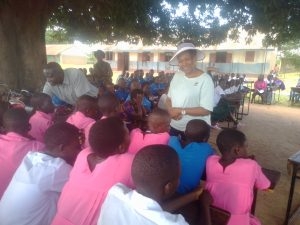
Roseline Mutyabule Ekemu, President of the Rotary Club of Kampala, emphasized that this initiative aligns with Rotary’s Seven Areas of Focus, which include health, education, water, sanitation, and community development. She confirmed that the medical camp would become an annual event, reflecting Rotary’s commitment to improving health outcomes and overall well-being in underserved communities. The event was organized following a February assessment that highlighted the health challenges faced by Kapir residents.
Dr. Charles Olaro, Director of Curative Services at the Ministry of Health and President of the Rotary Club of Sonde, played a pivotal role in the camp by personally providing medical care to patients. He noted that the large turnout reflected the community’s strong health-seeking behavior, particularly among women and children, who are often more proactive in accessing healthcare services.
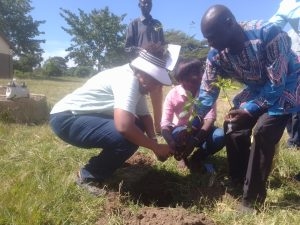
“Although many of these services are available at health facilities, the perception that medical camps provide more comprehensive care often drives higher participation,” Dr. Olaro explained. The camp focused on both preventive and curative services, including health education, immunizations, and screenings for malaria, TB, sickle cell disease, hypertension, and diabetes.
Malaria emerged as the most commonly diagnosed illness, highlighting the ongoing burden of communicable diseases in the region. In addition to malaria, the camp also addressed the high prevalence of sickle cell disease in the Teso region, which accounts for 21% of the national prevalence. The medical team screened patients for various conditions and linked those with serious illnesses to follow-up care at local health facilities.
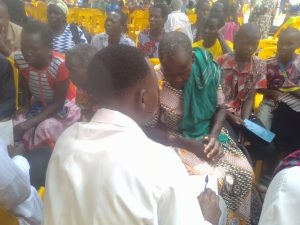
In response to the high number of women and children present, Dr. Olaro encouraged men to take a more active role in their health, especially considering the risks of conditions like prostate cancer, which were also being screened at the camp. “Men often wait until they are seriously ill to seek care,” he said. “We urge them to accompany their families and take advantage of the services available, especially for conditions like prostate cancer.”
The medical camp offered a wide array of services, including dental care, cancer screenings, mental health consultations, eye clinics, and more. The involvement of local health workers and Village Health Teams (VHTs) ensured that accurate health data was captured and shared with the Ministry of Health for further action.
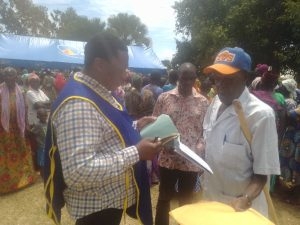
Aside from health services, the Rotary Club also engaged with local schools. They provided career guidance to Primary Seven students from seven schools in the sub-county, offering much-needed educational support and distributing scholastic materials.
Roseline Mutyabule Ekemu confirmed that the Rotary Club of Kampala has adopted Kapir as a long-term project. “We are committed to intervening in Rotary’s areas of focus, particularly maternal and child health, education, and environmental conservation,” she said. Plans to introduce environmental initiatives, such as tree planting in schools, were also mentioned as part of Rotary’s broader mission to uplift the community.
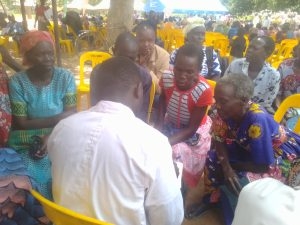
Local leaders, including Odong Lo’Asio, the Local Council Five Chairperson of Ngora and founder of the Rotary Club of Ngora, praised the initiative, calling it a “Christmas gift to the community.” He assured residents that efforts to resolve the water crisis at the Kapir Health Centre were underway, with plans to improve access to clean water.
Beneficiaries of the camp expressed their gratitude for the comprehensive services offered. Robert Ecaku, a local resident, appreciated the wide range of diagnostic and treatment options available—services that are often hard to access at regular health facilities. Another resident, Scovia Achero, who sought malaria treatment, highlighted the importance of the free medicine provided during the camp, noting that many people in the community struggle to access such resources.


